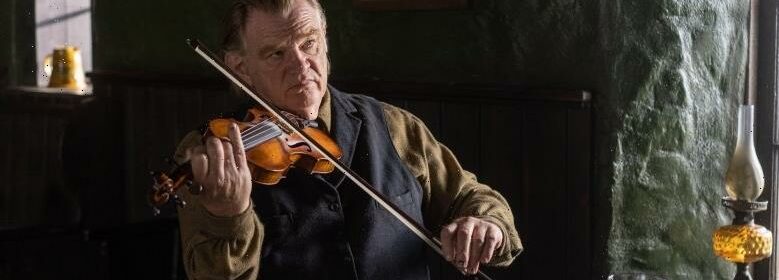For ‘The Banshees of Inisherin,’ Carter Burwell Left the Fiddling to Brendan Gleeson

Composer Carter Burwell initially thought he’d be responsible for creating the titular fiddle tune for Martin McDonagh’s “The Banshees of Inisherin.” In the screenplay, the song is one Colm Doherty (Brendan Gleeson) writes after having decided to no longer spend time with his former friend Pádraic Súilleabháin (Colin Farrell). But Gleeson, a fiddle player himself, wanted a crack at it. So he proposed a competition.
“Brendan said, ‘Well, let’s have Carter write a thing and I’ll write a thing and may the best tune win,’” Burwell told IndieWire. It didn’t fully surprise him, even though he’s never been in that situation before. The Irish musical tradition is filled with competition, according to Burwell. But the man behind the scores for “Fargo,” “Carol,” and the three previous movies directed by playwright and filmmaker McDonagh never ended up submitting his version. It wasn’t just that he was working on another project — although he was — but that he didn’t want to do anything that would interfere with Gleeson’s performance. If Gleeson had a tune he felt fit Colm’s journey, Burwell wanted to honor that. Plus, Burwell was headed down an entirely different path with the rest of the score, which eschews traditional Irish music for the eerie chimes of something out of a fantasy.
McDonagh’s latest film takes place on a tiny island off the coast of Ireland in 1923, as the Irish Civil War plays out in the background. That conflict is referenced obliquely, but the main source of the tension is the falling out between drinking buddies Colm and Pádraic. Colm thinks Pádraic is dull and wants to spend his remaining time on Earth doing something he feels significant, like making music. Pádraic cannot really understand what’s going on, not even after Colm threatens to cut a finger off for every time Pádraic bothers him.
When Burwell first got the screenplay, he thought there was a clear way to approach the music: It should be Irish shouldn’t it? During their last project, “Three Billboards Outside Ebbing, Missouri,” he had leaned into the Americana of the setting — why wouldn’t he do the same here? But that idea didn’t fly with McDonagh. “He literally said, ‘I hate ‘deedle-dee,’ old world, Irish film music,’” Burwell said. “He was thinking of things like John Ford’s ‘The Quiet Man.’” So Burwell put the script away and waited to see actual footage from the film.
After taking in what McDonagh had shot, Burwell found he had an entirely different inspiration: cartoons and fairy tales. “I started actually working on Colin’s character who always struck me even in the scripts as being very childlike, almost like a Disney character,” Burwell said. “He has a little miniature donkey. You can imagine little birdies flying around him.” The orchestration relied on sounds that conveyed a fantasy-like quality, including harp and celesta, the piano-like instrument that gives twinkling effect to Tchaikovsky’s “Dance of the Sugar Plum Fairy,” the “Mister Rogers’ Neighborhood” theme, and John Williams’ “Harry Potter” scores.
Around the same time Burwell was working on “Banshees,” he was reading “Grimms’ Fairy Tales” to his 11-year-old daughter, specifically the Grimms’ version of Cinderella, in which the stepsisters mutilate their feet in order to fit in the glass slipper. Burwell had a revelation: The cutting off limbs in that story is not that dissimilar to the threat that Colm makes. “I ended up going farther down that road of making the whole story a little bit more fairytale-like,” he said. “I really liked what that did.” It worked with other elements of McDonagh’s saga as well. After all, there’s a cloaked old lady who wanders about the island spewing prophecy almost like a witch.
For Burwell, all of his scores mesh tonal lightness and darkness, which made it easy to foreshadow impending violence even when the celesta theme drives the music at the beginning. “Eight octaves down from that, there are these big heavy, low bell tones that have these strange harmonics that are a little foreboding,” he said. “I don’t think you read it necessarily at the very beginning of the movie, but pretty soon it starts to express itself more and more.”
“The Banshees of Inisherin”
Jonathan Hession / courtesy of Searchlight Pictures
Burwell did seek to adhere almost entirely to McDonagh’s wishes, leaving the Irish music that functions diegetically in the film independent of his score. (Burwell, for his part, has a “weak point” for Celtic sounds.) As for what he thinks of Gleeson’s work? Well, he approves. “I think it’s good,” he said. “It really works well for his character when he describes to Colin Farrell’s character what it means to be a composer, to write new music.”
That question of what artists leave behind is one that resonates with Burwell. “Everybody who makes something that has some archival value, you do think about that,” he said. “You think, ‘I wonder if anybody will ever listen to this 20 years from now?’ It’s, of course, very egotistical. I personally think it’s a trap.”
Source: Read Full Article

